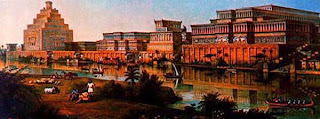For this reason I kneel before the Father, from whom his whole family in heaven and on earth derives its name.
. . . and from the Message:
My response is to get down on my knees before the Father, this magnificent Father who parcels out all heaven and earth.
 |
| by Unknown |
For this reason, I, Paul, the prisoner of Christ Jesus for the sake of you Gentiles -- (vs 1) . . . kneel (vs 14). Paul responds to the knowledge of God's unfathomable love for people (Jewish and Gentile alike) and God's enormous, immeasurable desire to save us (Jew and Gentile alike) and His glorious and rich plan to make us one by getting on his knees before the Father. It is a humble act on Paul's part. An act of submission to the One who is all-wise and who makes all of Paul's brilliance and genius seem like nothing. Up to his conversion, Paul lived a life of Jew against Gentile, Jew above Gentile; but, no longer. God's plan for the Gentiles is revealed and now the apostle lives to make it known. The Church, with all its cracks and flaws, is alive. At its best, it reflects the glory of Jesus Himself. At its worst, it reflects the reason we need Jesus. Paul knows this. He fought for it. He paid a great price for its growth (albeit, a price not comparable with that of Jesus).
This humble apostle knows who he is and to Whom he belongs. Friends, we are named after Him! We are God's family! Co-heirs with His Son! Adopted by Him and belonging to Him!
We do not belong here -- we belong in heaven . . . and heaven is a part of us here and now. The family of God is Jew and Gentile alike, no matter whether you are slave or free! (Gal. 3:28) And, here's a truth: we are both slave and free. A slave to sins that still grip us, but, in Christ, we live a free life . . . no longer condemned by those sins . . . not controlled by those sins, but controlled by the Spirit of God.Now if we are children, then we are heirs—heirs of God and co-heirs with Christ, if indeed we share in his sufferings in order that we may also share in his glory. Romans 8:17, NIV
. . . He predestined us to be adopted as his sons through Jesus Christ, in accordance with his pleasure and will— Ephesians 1:5, NIV
Therefore, there is now no condemnation for those who are in Christ Jesus, because through Christ Jesus the law of the Spirit of life set me free from the law of sin and death. Romans 8:1-2, NIV
You, however, are controlled not by the sinful nature but by the Spirit, if the Spirit of God lives in you. Romans 8:9a, NIV
 |
| The Church Militant and Triumphant by Andrea da Firenze |
The Church is alive. It has overcome the forces of evil that have tried to destroy it time and again. It is not a building. It is a Body! It is made up of men and women of all nationalities, different personalities, a plethora of gifts, many cracks and flaws . . . its head is Jesus, and, . . . it lives.
Paul fought hard for this truth so that nothing would divide it, but, instead it would be the Church triumphant! For this reason . . . he kneels.And God placed all things under his feet and appointed him to be head over everything for the church, which is his body, the fullness of him who fills everything in every way. Ephesians 1:22-23, NIV
This resurrection life you received from God is not a timid, grave-tending life. It's adventurously expectant, greeting God with a childlike "What's next, Papa?" God's Spirit touches our spirits and confirms who we really are. We know who he is, and we know who we are: Father and children. And we know we are going to get what's coming to us—an unbelievable inheritance! We go through exactly what Christ goes through. If we go through the hard times with him, then we're certainly going to go through the good times with him! Romans 8:15-17, MSG
Kerry






























